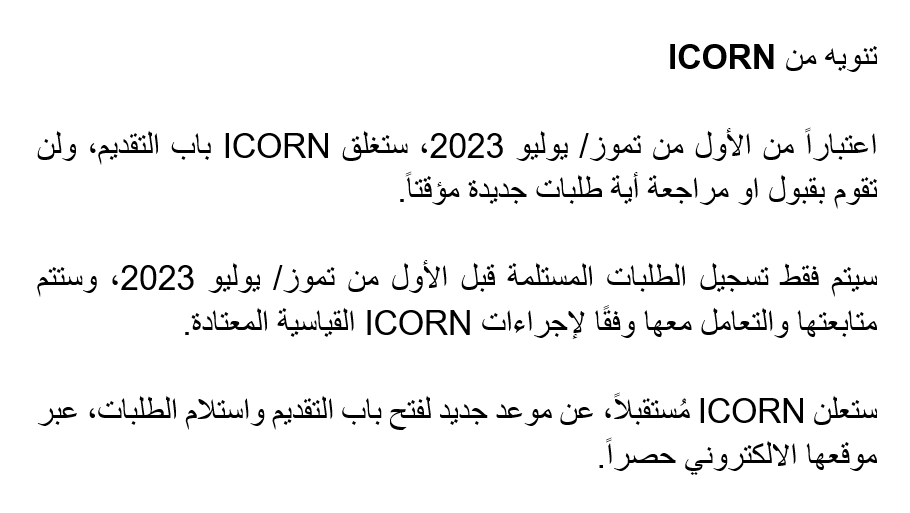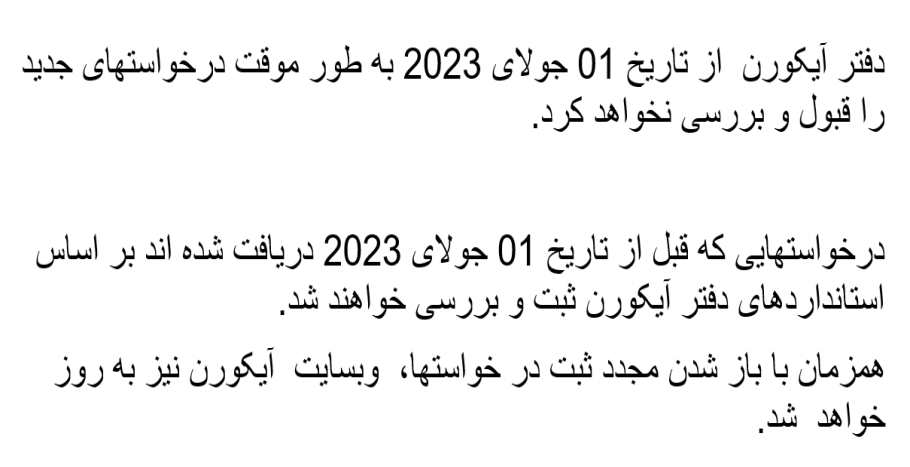APPLYING FOR AN ICORN RESIDENCY
ICORN is temporarily not accepting or reviewing new applications, nor responding to general requests.


دليل التقديم باللغة العربية - APPLICATION GUIDE IN ARABIC
راهنمای اپلیکیشن به زبان فارسی - APPLICATION GUIDE IN FARSI / PERSIAN
CONTENT
1. What is an ICORN residency?
2. Who can apply for an ICORN residency?
3. How do I apply for an ICORN residency?
4. The ICORN residency assessment process.
1. WHAT IS AN ICORN RESIDENCY?
An ICORN residency is a temporary, protective, non-emergency residency offered to a writer, artist, or journalist who is persecuted because of their published work and professional activities. The duration of an ICORN residency is typically two years.
The purpose of the ICORN residency is to provide a safe place for a writer, artist, or journalist where they can continue working freely and safely, expressing their ideas and opinions without interference.
What does an ICORN residency include:
Each ICORN residency is offered by one of the ICORN Cities of Refuge. Depending on the set-up, the ICORN residency can be coordinated by the local municipality, a cultural institution, or another organisation within the ICORN City of Refuge. The terms and conditions of ICORN residencies vary from city to city.
All ICORN residencies include, at least, housing and a grant covering living costs, as well as access to public services. The City of Refuge facilitates the ICORN resident in continuing their work and building a professional network.
The ICORN resident also benefits from regular follow-up with the ICORN Secretariat throughout their residency. When planning the future after the ICORN residency ends, the City of Refuge and the ICORN Secretariat advise and support the ICORN resident on professional and practical matters.
Applying for an ICORN residency:
To find more information on eligibility and the assessment and application process, please read the ‘Who can apply for an ICORN residency?’, ‘How do I apply for an ICORN residency?’, and ‘The ICORN residency assessment process’ sections of this page.
Selection and invitation process:
The ICORN Secretariat and the hosting ICORN City of Refuge cooperate in managing each ICORN residency invitation. The host ICORN City of Refuge makes the final decision on which writer, artist, or journalist is invited, based on the city’s resources i.e. housing, access to services, or other provisions.
The ICORN Cities of Refuge only invite writers, artists, or journalists who have been recommended by the ICORN Secretariat which manages the application, assessment, and invitation process. We kindly ask you not to contact the ICORN Cities of Refuge unless you have received a formal invitation for an ICORN residency.
ICORN cannot offer:
ICORN cannot offer emergency residencies or assistance. We strongly urge all applicants to seek alternative options for urgent safety and support needs. Please see: resources and information on emergency support.
ICORN is unable to offer visa or asylum status to people who have not been invited by one of the ICORN Cities of Refuge. ICORN has no influence over national immigration authorities and must abide by the laws and regulations of each country within which it operates.
2. WHO CAN APPLY FOR AN ICORN RESIDENCY?
Any writer, artist, or journalist facing threats and/or persecution for expressing their ideas and opinions through their professional work and activities can apply for an ICORN residency.
To apply for an ICORN residency, you must be able to document professional literary, artistic, or journalistic production. Typically, this means having published books, articles, cartoons, albums, or the equivalent. If you are self-published, you need to show evidence of regular output of original material over a substantial period, and of being recognised for it.
What does ICORN mean by ‘writer’, ‘artist’, and ‘journalist’?
ICORN uses these terms broadly to include (for instance, but not exhaustively):
- Creative writers (novelists, poets, short story writers, lyricists, playwrights, screenwriters).
- Non-fiction writers (journalists, academics, essayists, textbook writers, bloggers).
- Editors, publishers, and translators.
- Artists (painters, photographers, sculptors, cartoonists, performance artists, new media artists).
- Musicians (composers, producers, musicians, singers).
Persecution
In your application, you need to demonstrate that one of the following categories applies to you:
- At risk as a direct consequence of your writing or artistic production - in danger of being killed, abducted, physically attacked, or ‘disappeared’.
- Sentenced to, or at risk of being imprisoned by state and/or non-state actors as a direct result of your writing and/or artistic production.
- Unable to express yourself freely through your writing and/or artistic production for fear of persecution due to actual and/or probable actions by state and/or non-state actors in your country of residence.
3. HOW DO I APPLY FOR AN ICORN RESIDENCY?
If, after reading the section above, you believe that you might be eligible for an ICORN residency and wish to apply, please contact ICORN at application@icorn.org.
If necessary, individuals other than the applicant can contact ICORN and fill out the application form on their behalf. In such cases, we would like to know who is acting on the applicant’s behalf and why.
The preferred language of communication is English and the ICORN application form is available in English only. If you cannot communicate in English, please list the languages you speak.
ICORN highly recommends that you consider your online safety in general and when communicating with ICORN. Please visit our Protection, Safety and Security page for further information and resources.
All information sent to ICORN is stored and treated as confidential.
Free of charge:
Applying for an ICORN residency is free of charge. You should never be asked to pay to submit an ICORN application. ICORN does not have staff or consultants who are employed to assist in writing an ICORN application or to advise on the application process.
If you are asked to pay to apply for an ICORN residency or are approached by people claiming to work for ICORN, please inform us at application@icorn.org.
4. THE ICORN RESIDENCY ASSESSMENT PROCESS
ICORN will consider your application based on your professional activity, your protection needs, and your current situation. If necessary, ICORN will get in touch with your references and/or verify the information you have provided with trusted partners.
We strongly urge all applicants to consider alternative options for any safety requirements they may have as ICORN is not an urgent response organisation and has a limited number of residencies available each year. Please find resources and information here.
Testimonial of Chenjerai Hove (Zimbabwe)
Stavanger City of Refuge 2005-2007The most painful decision for me was to have to leave my country.
— Chenjerai Hove







